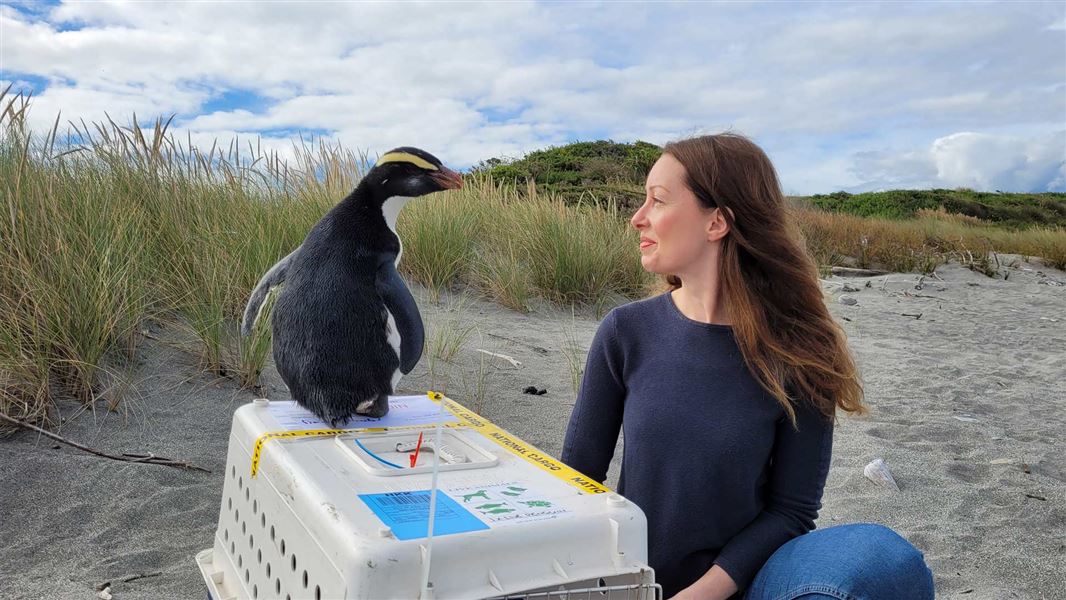Date: 10 January 2024
The female tawaki was picked up in Scarborough, Christchurch, on 14 August and taken to Christchurch Penguin Rehabilitation.
DOC Mahaanui Biodiversity Supervisor Craig Alexander says when found the tawaki was underweight and missing some chest feathers which affected her waterproofing.
“Based on the marks on the penguin’s chest, we think it’s likely she had a run-in with a shark or other large predator and made a narrow escape but was nicked by the predator’s teeth in the process.”
Craig Alexander says the tawaki stayed in rehab until she fattened up and her feathers regrew, meaning she could go back to the wild.
“The tawaki was a long way from home when we picked it up, they’re not a regular visitor to Christchurch shores. Tawaki colonies are in South Westland and Stewart Island, so the penguin was flown across to Hokitika for release closer to home, thanks to Air New Zealand.”
Kristina from Christchurch Penguin Rehabilitation says they never expected the tawaki to stay for four and a half months.
“The encounter with a large predator left two patches of damaged feathers and inflamed skin. The South Island Wildlife Hospital made two attempts to remove the damaged feathers, to encourage new growth, but this was only partly successful – not enough feathers grew back to provide the fully waterproof plumage needed to survive in the wild.
“The only option was to wait for the natural annual moult, which finally started before Christmas. The tawaki developed an enormous appetite and gained a lot of weight, then the moult started in full.
“Now all the feathers have grown back and she has a beautiful new coat of feathers, the tawaki is ready to go back to the ocean.
“Feeding a penguin for more than four months needs a lot of fish, as she was eating up to 800g a day. Without the support from King Salmon and Akaroa Salmon, it would have been difficult to get fish of the right size.”
DOC Fauna Technical Advisor Cassie Mealey collected the tawaki from the Hokitika airport on 9 January.
“The tawaki landed safe and sound in Hokitika with proud Air New Zealand staff delivering her safely from the plane. She drew quite the crowd at the small airport with people very interested in her story.”
“Opening up the cage on the beach for release, she immediately bolted out. She then became a bit shy, perhaps realising she is in an entirely unfamiliar place, however, after a bit of an explore, she found the water. With some encouragement she ran into the ocean, diving under waves and swimming nearby happily before disappearing out into the big blue.”
Cassie Mealey says the penguin is following behind another two tawaki which were released from Hokitika Beach together on 13 December after separately washing up a bit worse for wear in short succession.
“When found, the birds – an adult and juvenile – they were skinny, exhausted, missing their waterproof coating on the feathers, and one had lacerations to its flippers.
“The younger tawaki was sent to the South Island Wildlife Hospital for treatment to its flipper wounds, which were likely from barracuda bites. As an authorised wildlife rehabilitator, I cared for the adult tawaki in Hokitika with support through fish donations from the local New World and seafood company Solander.”
Cassie Mealey says the tawaki were healthy, plump and fit enough to head back into the wild after four weeks of rest, rehydration, feeding and swim training.
Tawaki are only found in Aotearoa and have a conservation status of “At Risk – Declining”. A taonga species, they are one of the rarest penguins in New Zealand with an estimated population of 2,500-3,000 breeding pairs.
Their main threats include human disturbances on the shoreline (including from dogs), introduced predators, climate change, and fishing bycatch.
Standing about 60 cm tall, tawaki have an impressive yellow crest of feathers starting from near the nostril and extending out the back of the head.
Anyone who comes across a sick or injured penguin in the wild should call the DOC Hotline 0800 DOC HOT (0800 362 468).
Contact
For media enquiries contact:
Email: media@doc.govt.nz
